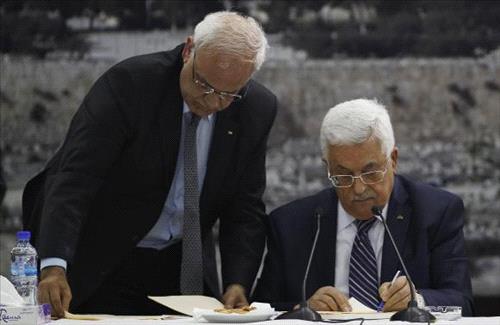Ammon News - (Reuters) - Israeli and Palestinian negotiators on Tuesday ended another U.S.-mediated session with no sign of a breakthrough in efforts to save peace talks from collapse but an Israeli official said they agreed to meet again.
In a statement about the latest discussions, U.S. State Department spokeswoman Jen Psaki said: "Gaps remain but both sides are committed to narrow the gaps."
The U.S.-brokered negotiations, which began in July, plunged into crisis last week after Israel, demanding a Palestinian commitment to continue talking beyond an April 29 deadline for a peace deal, failed to carry out a promised release of about two dozen Palestinian prisoners.
Palestinian President Mahmoud Abbas responded by signing 15 global treaties, including the Geneva Conventions on the conduct of war and occupations, on behalf of the State of Palestine, a defiant move that surprised Washington and angered Israel.
Israeli Foreign Minister Avidgor Lieberman, speaking on Israel Radio on Tuesday, said Abbas would have to reverse that step in order for the prisoner release to be re-addressed. Prime Minister Benjamin Netanyahu has threatened unspecified retaliation in response to the signings.
As part of the U.S.-led bid to salvage the talks, Israeli chief negotiator Tzipi Livni and Palestinian counterpart Saeb Erekat, along with U.S. mediator Martin Indyk, reconvened late on Monday after what the United States had described as a "serious and constructive" meeting on Sunday.
"The atmosphere was business-like and the sides agreed to meet again to try to find a solution to the crisis," said an Israeli official, who asked not to be identified, after the latest talks wrapped up in the early hours of Tuesday.
The official did not say when the next meeting would be held, and there was no immediate Palestinian comment.
STUMBLING BLOCKS
Expectations among the Israeli and Palestinian public of a peace deal have been low from the start. The talks have stalled over Palestinian opposition to Israel's demand that it be recognized as a Jewish state, and over settlements built on occupied land Palestinians seek for a country of their own.
Secretary of State John Kerry signaled on Friday he may scale back his intense mediating efforts due to "unhelpful actions" by Israel and the Palestinians, saying it was time for a "reality check" and Washington would re-evaluate its role.
Kerry is scheduled to meet President Barack Obama at the White House on Tuesday, with the state of the peace efforts high on the agenda.
A senior official in Abbas' Fatah party said that in order for the talks to continue, Palestinians would need a written commitment from Israel recognizing a Palestinian state within all of the territory in the West Bank and Gaza Strip captured in the 1967 Middle East war, with East Jerusalem as its capital.
Israel has described those West Bank borders as indefensible and considers East Jerusalem as part of its capital, a claim that is not recognized internationally. Israel pulled out of the Gaza Strip, now ruled by Hamas Islamists, in 2005.
The Fatah official said Palestinians were also demanding a cessation of settlement activity and a prisoner release.
Lieberman accused the Palestinians of presenting "an ultimatum", and said Israel wanted peace talks to focus on security arrangements that would accompany the creation of a Palestinian state.
Palestinians fear settlements, viewed as illegal by most countries, will deny them a viable state and have condemned a series of Israeli construction projects announced while talks have been under way.
